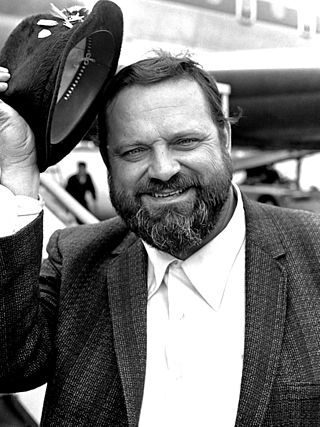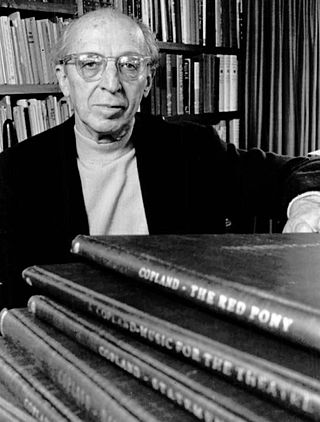A fanfare is a flourish of music for brass instruments.
Contents
Fanfare may also refer to:
A fanfare is a flourish of music for brass instruments.
Fanfare may also refer to:
Queen or QUEEN may refer to:
Coda or CODA may refer to:

The celesta or celeste, also called a bell-piano, is a struck idiophone operated by a keyboard. It looks similar to an upright piano, albeit with smaller keys and a much smaller cabinet, or a large wooden music box (three-octave). The keys connect to hammers that strike a graduated set of metal plates or bars suspended over wooden resonators. Four- or five-octave models usually have a damper pedal that sustains or damps the sound. The three-octave instruments do not have a pedal because of their small "table-top" design. One of the best-known works that uses the celesta is Pyotr Ilyich Tchaikovsky's "Dance of the Sugar Plum Fairy" from The Nutcracker.
A circus is a traveling company of performers that may include acrobats, clowns, trained animals, and other novelty acts.

"Penny Lane" is a song by the English rock band the Beatles that was released as a double A-side single with "Strawberry Fields Forever" in February 1967. It was written primarily by Paul McCartney and credited to the Lennon–McCartney songwriting partnership. The lyrics refer to Penny Lane, a street in Liverpool, and make mention of the sights and characters that McCartney recalled from his upbringing in the city.

Alois Maxwell "Al" Hirt was an American trumpeter and bandleader. He is best remembered for his million-selling recordings of "Java" and the accompanying album Honey in the Horn (1963), and for the theme music to The Green Hornet. His nicknames included "Jumbo" and "The Round Mound of Sound". Colin Escott, an author of musician biographies, wrote that RCA Victor, for which Hirt had recorded most of his best-selling recordings and for which he had spent most of his professional recording career, had dubbed him with another moniker: "The King." Hirt was inducted into The Louisiana Music Hall of Fame in November 2009. He received 21 Grammy nominations during his lifetime, including winning the Grammy award in 1964 for his version of "Java".

Herb Alpert is an American trumpeter who led the band Herb Alpert & the Tijuana Brass in the 1960s. During the same decade, he co-founded A&M Records with Jerry Moss. Alpert has recorded 28 albums that have landed on the U.S. Billboard 200 chart, five of which became No. 1 albums; he has scored 14 platinum albums and 15 gold albums. Alpert is the only musician to hit No. 1 on the U.S. Billboard Hot 100 as both a vocalist and an instrumentalist.
The Door may refer to:

Fanfare for the Common Man is a musical work by the American composer Aaron Copland. It was written in 1942 for the Cincinnati Symphony Orchestra under conductor Eugene Goossens and was inspired in part by a speech made earlier that year by then American Vice President Henry A. Wallace, in which Wallace proclaimed the dawning of the "Century of the Common Man".
Gordon Percival Septimus Jacob CBE was an English composer and teacher. He was a professor at the Royal College of Music in London from 1924 until his retirement in 1966, and published four books and many articles about music. As a composer he was prolific: the list of his works totals more than 700, mostly compositions of his own, but a substantial minority of orchestrations and arrangements of other composers' works. Those whose music he orchestrated range from William Byrd to Edward Elgar to Noël Coward.
A parade is a procession of people.

Fanfare Ciocărlia is a twelve-piece Romani Balkan brass band from the northeastern Romanian village of Zece Prăjini. They are known for their fast, high-energy music with complex rhythms and high-speed staccato clarinet, saxophone, and trumpet solos.
Girl Next Door, or variants, may refer to:

"True" is a song by English pop band Spandau Ballet, released in April 1983 as the title track and third single from their third studio album. It was written by the band's guitarist/songwriter Gary Kemp to express his feelings for Altered Images lead singer Clare Grogan, influenced musically by songs of Marvin Gaye and Al Green he was listening to at the time, and lyrically by Green and The Beatles. It eventually reached number one on the UK chart in April 1983 and made the top 10 in several other countries, including the US, where it became their first song to reach the Billboard Hot 100.

Jeff Beal is an American composer of music for film, television, recordings, and the concert hall. Highly regarded as a jazz instrumentalist and versatile composer, Beal creates music that often incorporates a synthesis of improvisatory and composed elements.

William P. Perry is an American composer and producer of television and film. His music has been performed by the Chicago Symphony, the Saint Louis Symphony, the Detroit Symphony and the symphonic orchestras of Cincinnati, Minnesota, Montreal, Calgary and Hartford as well as the Vienna Symphony, the Rome Philharmonic, the Slovak Philharmonic, the RTÉ National Symphony of Ireland and other orchestras in Europe.
Fanfare is a one-act ballet choreographed by Jerome Robbins to Benjamin Britten's The Young Person's Guide to the Orchestra, in celebration of the Coronation of Queen Elizabeth II. The ballet premiered on June 2, 1953, the night of the coronation, at the City Center of Music and Drama, danced by the New York City Ballet.

"Gold" is a song by English pop band Spandau Ballet, released on 5 August 1983 as the fourth single from their third album, True. The song was written by the band's guitarist/songwriter Gary Kemp as an homage to the film themes of composer John Barry that was especially influenced by his scores for the James Bond series. This was apparent to some music critics, but they were sharply divided in their reviews. Some appreciated the energy and drama behind it while others found it affected and overwrought. The song peaked at number 2 on the UK Singles Chart and made the top 10 in several other countries, but its number 29 showing in the US and the disappointing chart performances of the next two singles released there led to the band's decision to change record labels.
Rodeo is a ballet composed by Aaron Copland and choreographed by Agnes de Mille, which premiered in 1942. Subtitled "The Courting at Burnt Ranch", the ballet consists of five sections: "Buckaroo Holiday", "Corral Nocturne", "Ranch House Party", "Saturday Night Waltz", and "Hoe-Down". The symphonic version omits "Ranch House Party", leaving the other sections relatively intact.
A king is a male monarch.